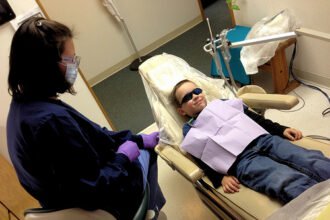Most of the leading medical journals are published in the US ; and most of the authors of the authoritative medical textbooks work in US medical schools . If doctors need advanced training in a particular area, they usually travel to the US ; and lots of the newest medical equipment, tools, technology, and drugs come from companies located in the US. Most keynote speakers at international medical conferences come from the US ; and because medical journals are published in the US , a disproportionate amount of papers published in the medical literature originate from medical centers in the US.
This is why most doctors look up to US doctors ; and this is one of the reasons why the American medical system has such a disproportionate impact on the rest of the world. I can vouch for this from my personal experience as well. When I was a medical student , the medical books we read were all authored by US physicians ; and when I needed to complete my training, I chose to go to the Johns Hopkins and Harvard because they were supposed to be the best medical centers in the world.
While I have a lot of respect and admiration for US doctors, I think the sad truth is that the US healthcare model is broken. While there are still pockets of excellent, the system itself is dysfunctional .
US healthcare is very technology dependent and there is a lot of mindless over testing in the US. There are many reasons for this. Americans have always prided themselves on their technological expertise, and they put a disproportionate amount of their trust in tools and technology in all parts of their life. It’s therefore hardly surprising that they will do this in healthcare as well.
Since so many of these technological innovations originate in the academic medical centers in the US, medical professors and researchers aggressively promote the use of these devices by giving lectures all over the world. The one thing the US is still the undisputed world leader in is marketing and advertising – and they apply these skills to the healthcare field as well.
Since the “Made in the US “ label is considered to be a prestigious badge, and since these professors actively publish their findings and disseminate them in international conferences, doctors all over the world ate happy to imitate them.
The doctors who author textbooks are those who work in academic medical centers , and they tend to over emphasize uncommon problems, because these are what they find interesting. When you consider medical journals ( which is what most doctors read in order to remain au courant, the situation is even worse, because journals only publish case reports about rare and unusual problems. Medical journals are full of zebra – which most doctors will never see in their lifetime . However, doctors who read these journals then start looking for the zebras in their medical practice , because they want to have their paper published in the medical journal as well – this is considered to be a status symbol in the academic world.
The problem with all this testing is that it’s very easy to tick off boxes asking for panels of tests , but it’s not very easy to think about which tests are required , and when. Because doctors love rare cases , they often order many tests , in order to pick up the unusual patient with the rare abnormality , so that they can brag to their colleagues about the diagnostic acumen. However , they fail to think about how much of the testing is completely inappropriate and uncalled for. A patient of mine who has had recurrent pregnancy losses, and now lives in the US , wrote about how a nurse automatically collected over 22 test tubes of blood for testing , saying this is part of our routine workup for recurrent pregnancy loss. While this may seem very impressive , and patients can be very impressed by how thorough their doctor is and how painstakingly they hunt for problems, the fact is that most of her test results will come back as normal , and therefore not add any value at all to her medical care . This is the elephant in the room, which no one talks about – the sheer waste in routine US healthcare. To make a bad situation worse, not only are many of these new tests much more expensive , they also much harder to interpret , because they’ve not been standardized, and no one really knows what abnormal results mean , because we don’t have enough experience with them.
Not only do doctors love ordering all these fancy new tests , they get very excited when one of the results come back as abnormal . They pat themselves on the back , because they finally identified the problem and picked up an abnormality which the earlier doctor had missed. Patients are also quite happy , because they feel that their new clever doctor has pinpointed the problem , and therefore will be able to provide an effective solution. However, it is a mathematical certainty that the more the tests your doctor orders, the more the abnormalities he will find – but a lot of these abnormal findings are red herrings , which have no clinical value at all , because they do not affect the clinical care of the patient.
American medicine, like a lot of other areas in America , has become wasteful because it has been supersized. We need to realize that this is not the best way of practicing medicine , and we need to start learning what I call frugal medicine.
Frugal medicine requires a thoughtful talk to intelligent, caring able to listen to the patient is selective about what tests the authors. These are not easy skills to acquire and there are not many role models to follow. Unfortunately, the commercial demands of modern medicine and the aggressive marketing by large multinational, multibillion dollar diagnostic testing industries and device manufacturers will mean that patients will have to do a lot of hard work if you want to find doctors who willing to practice cost-effective sensible medicine
Bigger is better is a broken model. Small is beautiful !






